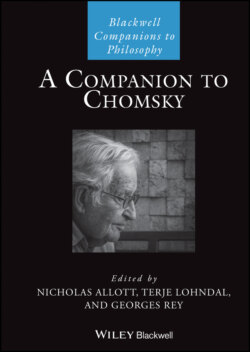Читать книгу A Companion to Chomsky - Группа авторов - Страница 41
4.1 Introduction
ОглавлениеWe suspect that those interested in the enduring discoveries of generative syntax wish to read about empirically supported assertions about natural language syntax advanced by generative linguists (discoveries) that are currently not disproven and that are still routinely mentioned in the generative syntax literature, usually as a diagnostic tool (enduring). Acting on this suspicion, our discussion in this chapter is restricted to assertions that fit this description. Because constraints on space require us to be selective, and in order to maintain thematic alignment with other chapters in this volume, we limit our presentation to those enduring discoveries that we consider to be indisputably generative in character, insofar as they are a natural and conspicuous product of the research methodology engendered by Chomsky's philosophical commitments and his general vision for linguistic research.1 We begin by discussing how the two main goals of generative research, which were cemented in Chomsky's earliest writings, yield a practical research methodology that allows for the rapid accumulation of new linguistic data and knowledge; a methodology that early adopters exploited to make many of the field's enduring discoveries (Section 4.2). We then discuss how, by introducing the linguistic community to generativism via his transformational theory, Chomsky fixed early research attention on nonlocal dependencies, about which many of the field's enduring discoveries are concerned (Section 4.3). Section 4.3.1 discusses the enduring discoveries made about the hierarchical syntactic structures on which nonlocal dependencies are instantiated, Section 4.3.2 reflects on the variety of nonlocal dependencies that generative research has uncovered, and Section 4.3.3 focuses on so‐called gaps or empty categories, which frequently feature as members in nonlocal dependencies. We provide concluding remarks in Section 4.4.
